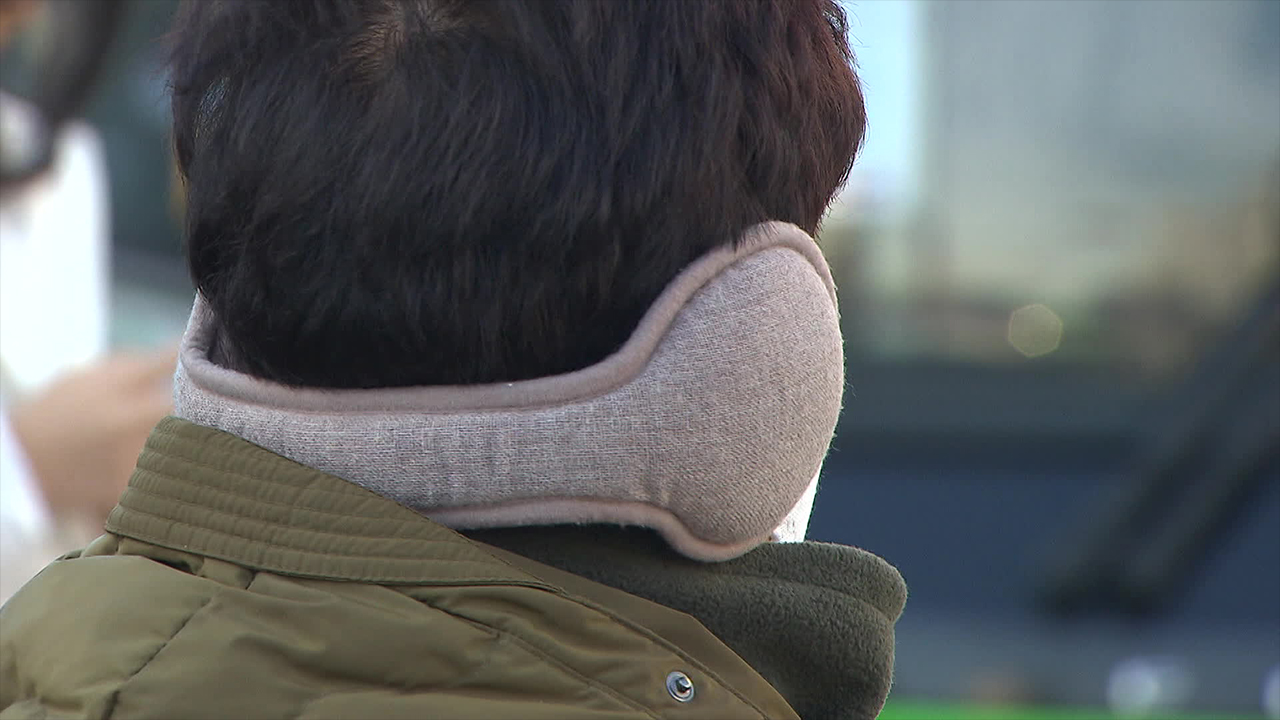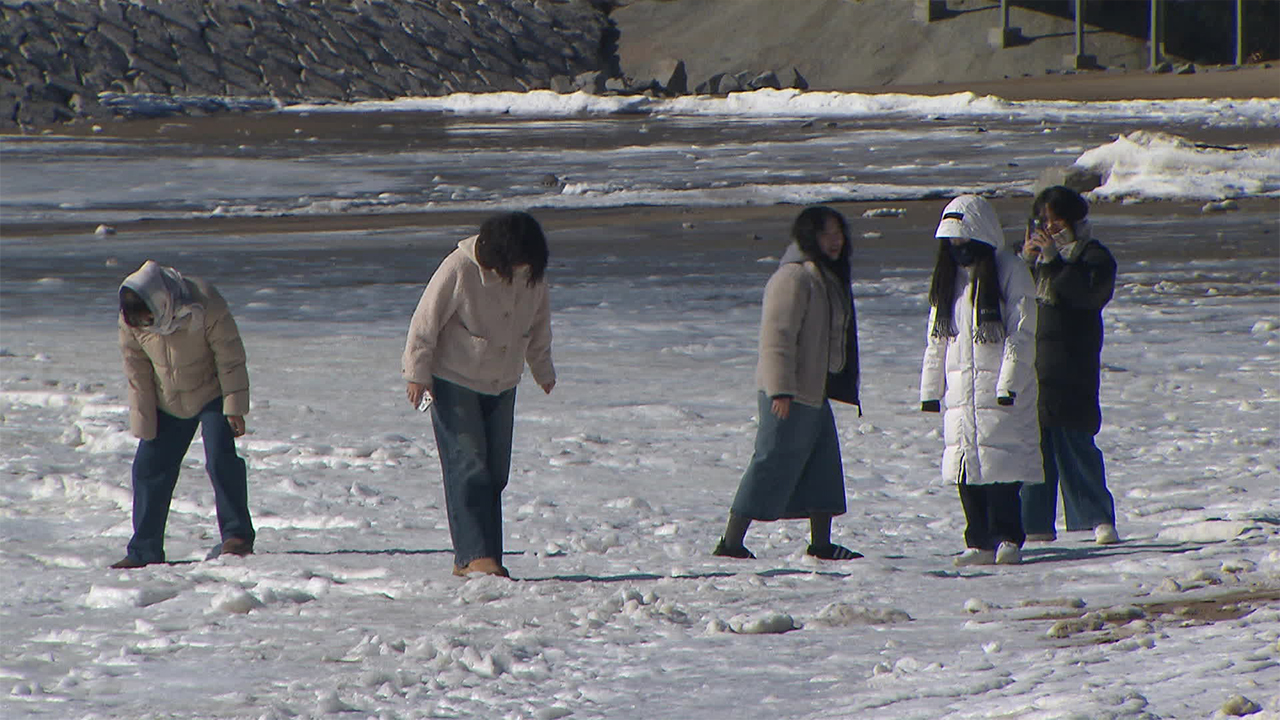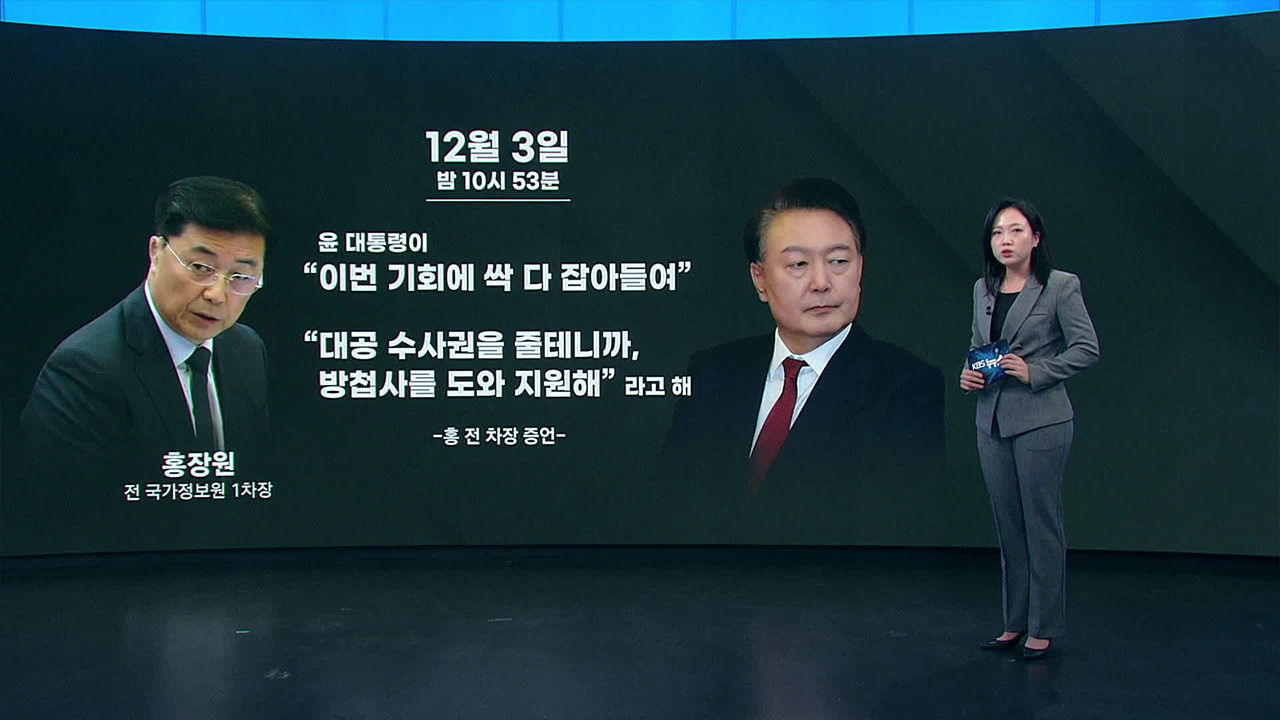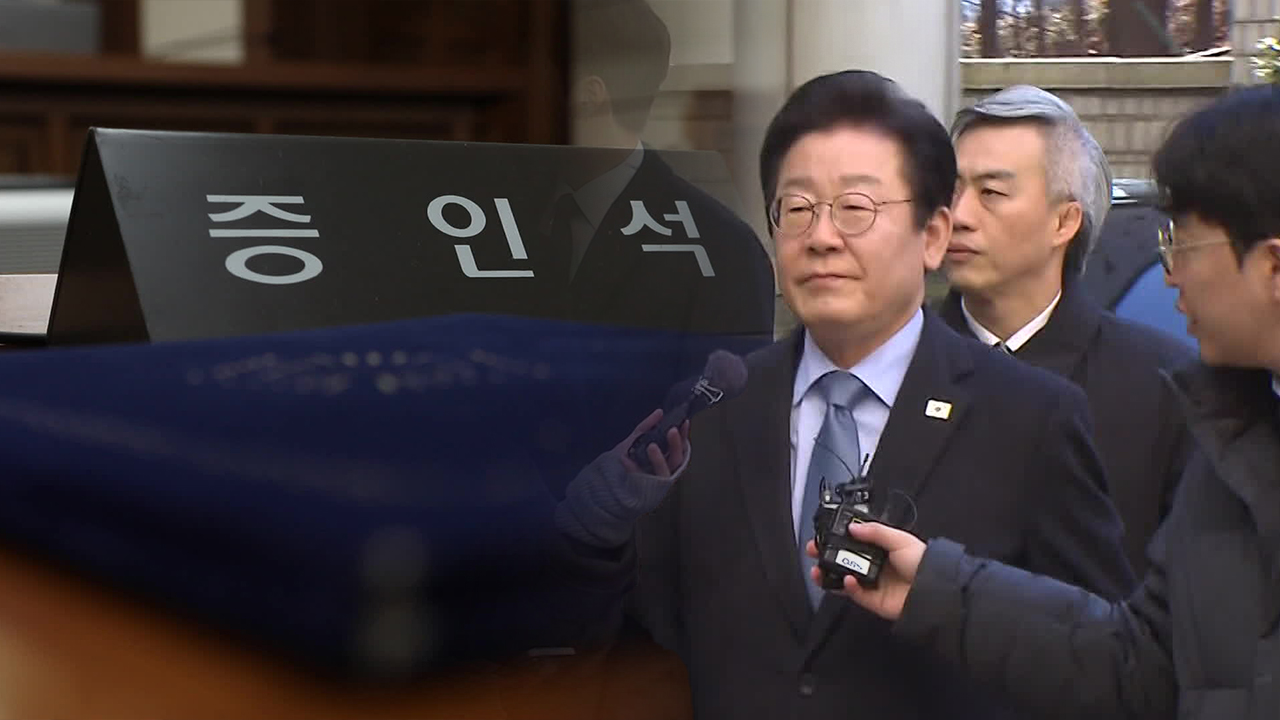Cold-related illnesses alert
입력 2025.01.11 (00:15)
수정 2025.01.11 (00:16)
읽어주기 기능은 크롬기반의
브라우저에서만 사용하실 수 있습니다.
[Anchor]
It seems that this severe cold wave will continue until tomorrow (1.11), which is Saturday.
As the extreme cold persists, the number of cold-related illnesses, particularly among the elderly, is increasing, necessitating special caution.
Next, we have a report from meteorological specialist Lee Se-heum.
[Report]
This morning (1.10), as the cold wave reached its peak, citizens' clothing for their commute became thicker.
The biting cold naturally makes shoulders hunch.
The morning temperature in Seoul dropped below minus 12 degrees Celsius, making it the coldest day of this winter.
In Myeonon-myeon, Pyeongchang-gun, Gangwon Province, the morning temperature plummeted to minus 24.9 degrees, the lowest in the country.
The cold wave will continue until Saturday morning and will gradually recede thereafter.
[Kim Byeong-kwon/Korea Meteorological Administration Forecast Analyst: "Due to radiative cooling overnight, the morning temperature on the 11th, Saturday, is expected to be around minus 8 degrees, but from the afternoon, temperatures will gradually rise, returning to normal levels."]
The Korea Meteorological Administration predicts that another cold wave will arrive in the middle of next week.
As cold waves have been occurring periodically this winter, the number of cold-related illnesses continues to rise.
From December of last year until yesterday (1.9), 150 people visited the emergency room due to hypothermia, and among them, 4 have died.
More than half of the cold-related patients this winter are aged 65 and older.
[Ahn Yoon-jin/Director of Health Risk Management, Disease Control Agency: "Children and the elderly have a harder time controlling their body temperature than the general adult population, so they need to be more cautious. Even if going out for a short time, they should pay attention to keeping warm."]
Frequent drinking gatherings during the year-end and New Year period should also be approached with caution.
In a state of intoxication, the sensitivity to cold decreases, and body temperature is lost more quickly, increasing the risk of cold-related illnesses.
This is KBS News, Lee Se-heum.
It seems that this severe cold wave will continue until tomorrow (1.11), which is Saturday.
As the extreme cold persists, the number of cold-related illnesses, particularly among the elderly, is increasing, necessitating special caution.
Next, we have a report from meteorological specialist Lee Se-heum.
[Report]
This morning (1.10), as the cold wave reached its peak, citizens' clothing for their commute became thicker.
The biting cold naturally makes shoulders hunch.
The morning temperature in Seoul dropped below minus 12 degrees Celsius, making it the coldest day of this winter.
In Myeonon-myeon, Pyeongchang-gun, Gangwon Province, the morning temperature plummeted to minus 24.9 degrees, the lowest in the country.
The cold wave will continue until Saturday morning and will gradually recede thereafter.
[Kim Byeong-kwon/Korea Meteorological Administration Forecast Analyst: "Due to radiative cooling overnight, the morning temperature on the 11th, Saturday, is expected to be around minus 8 degrees, but from the afternoon, temperatures will gradually rise, returning to normal levels."]
The Korea Meteorological Administration predicts that another cold wave will arrive in the middle of next week.
As cold waves have been occurring periodically this winter, the number of cold-related illnesses continues to rise.
From December of last year until yesterday (1.9), 150 people visited the emergency room due to hypothermia, and among them, 4 have died.
More than half of the cold-related patients this winter are aged 65 and older.
[Ahn Yoon-jin/Director of Health Risk Management, Disease Control Agency: "Children and the elderly have a harder time controlling their body temperature than the general adult population, so they need to be more cautious. Even if going out for a short time, they should pay attention to keeping warm."]
Frequent drinking gatherings during the year-end and New Year period should also be approached with caution.
In a state of intoxication, the sensitivity to cold decreases, and body temperature is lost more quickly, increasing the risk of cold-related illnesses.
This is KBS News, Lee Se-heum.
■ 제보하기
▷ 카카오톡 : 'KBS제보' 검색, 채널 추가
▷ 전화 : 02-781-1234, 4444
▷ 이메일 : kbs1234@kbs.co.kr
▷ 유튜브, 네이버, 카카오에서도 KBS뉴스를 구독해주세요!
- Cold-related illnesses alert
-
- 입력 2025-01-11 00:15:14
- 수정2025-01-11 00:16:18

[Anchor]
It seems that this severe cold wave will continue until tomorrow (1.11), which is Saturday.
As the extreme cold persists, the number of cold-related illnesses, particularly among the elderly, is increasing, necessitating special caution.
Next, we have a report from meteorological specialist Lee Se-heum.
[Report]
This morning (1.10), as the cold wave reached its peak, citizens' clothing for their commute became thicker.
The biting cold naturally makes shoulders hunch.
The morning temperature in Seoul dropped below minus 12 degrees Celsius, making it the coldest day of this winter.
In Myeonon-myeon, Pyeongchang-gun, Gangwon Province, the morning temperature plummeted to minus 24.9 degrees, the lowest in the country.
The cold wave will continue until Saturday morning and will gradually recede thereafter.
[Kim Byeong-kwon/Korea Meteorological Administration Forecast Analyst: "Due to radiative cooling overnight, the morning temperature on the 11th, Saturday, is expected to be around minus 8 degrees, but from the afternoon, temperatures will gradually rise, returning to normal levels."]
The Korea Meteorological Administration predicts that another cold wave will arrive in the middle of next week.
As cold waves have been occurring periodically this winter, the number of cold-related illnesses continues to rise.
From December of last year until yesterday (1.9), 150 people visited the emergency room due to hypothermia, and among them, 4 have died.
More than half of the cold-related patients this winter are aged 65 and older.
[Ahn Yoon-jin/Director of Health Risk Management, Disease Control Agency: "Children and the elderly have a harder time controlling their body temperature than the general adult population, so they need to be more cautious. Even if going out for a short time, they should pay attention to keeping warm."]
Frequent drinking gatherings during the year-end and New Year period should also be approached with caution.
In a state of intoxication, the sensitivity to cold decreases, and body temperature is lost more quickly, increasing the risk of cold-related illnesses.
This is KBS News, Lee Se-heum.
It seems that this severe cold wave will continue until tomorrow (1.11), which is Saturday.
As the extreme cold persists, the number of cold-related illnesses, particularly among the elderly, is increasing, necessitating special caution.
Next, we have a report from meteorological specialist Lee Se-heum.
[Report]
This morning (1.10), as the cold wave reached its peak, citizens' clothing for their commute became thicker.
The biting cold naturally makes shoulders hunch.
The morning temperature in Seoul dropped below minus 12 degrees Celsius, making it the coldest day of this winter.
In Myeonon-myeon, Pyeongchang-gun, Gangwon Province, the morning temperature plummeted to minus 24.9 degrees, the lowest in the country.
The cold wave will continue until Saturday morning and will gradually recede thereafter.
[Kim Byeong-kwon/Korea Meteorological Administration Forecast Analyst: "Due to radiative cooling overnight, the morning temperature on the 11th, Saturday, is expected to be around minus 8 degrees, but from the afternoon, temperatures will gradually rise, returning to normal levels."]
The Korea Meteorological Administration predicts that another cold wave will arrive in the middle of next week.
As cold waves have been occurring periodically this winter, the number of cold-related illnesses continues to rise.
From December of last year until yesterday (1.9), 150 people visited the emergency room due to hypothermia, and among them, 4 have died.
More than half of the cold-related patients this winter are aged 65 and older.
[Ahn Yoon-jin/Director of Health Risk Management, Disease Control Agency: "Children and the elderly have a harder time controlling their body temperature than the general adult population, so they need to be more cautious. Even if going out for a short time, they should pay attention to keeping warm."]
Frequent drinking gatherings during the year-end and New Year period should also be approached with caution.
In a state of intoxication, the sensitivity to cold decreases, and body temperature is lost more quickly, increasing the risk of cold-related illnesses.
This is KBS News, Lee Se-heum.
-
-

이세흠 기자 hmm@kbs.co.kr
이세흠 기자의 기사 모음
-
이 기사가 좋으셨다면
-
좋아요
0
-
응원해요
0
-
후속 원해요
0















이 기사에 대한 의견을 남겨주세요.